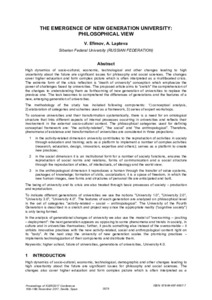The emergence of new generation university: philosophical view
URI (для ссылок/цитирований):
https://library.iated.org/view/EFIMOV2017EMEhttps://elib.sfu-kras.ru/handle/2311/110732
Автор:
Efimov, V.
Lapteva, A.
Коллективный автор:
Научно-исследовательская часть
Дата:
2017-11Журнал:
ICERI2017 Proceedings 10th annual International Conference of Education, Research and Innovation, November 16th-18th, 2017 – Seville, SpainКвартиль журнала в Web of Science:
без квартиляБиблиографическое описание:
Efimov, V. The emergence of new generation university: philosophical view [Текст] / V. Efimov, A. Lapteva // ICERI2017 Proceedings 10th annual International Conference of Education, Research and Innovation, November 16th-18th, 2017 – Seville, Spain. — 2017. — С. 579-588Текст статьи не публикуется в открытом доступе в соответствии с политикой журнала.
Аннотация:
High dynamics of socio-cultural, economic, technological and other changes leading to high uncertainty about the future are significant issues for philosophy and social sciences. The changes cover higher education and form complex picture which is often interpreted as a multifaceted crisis. The extreme form of the crisis reflection is “death of university” conception which emphasize the power of challenges faced by universities. The proposed article aims to “switch” the comprehension of the changes to understanding them as forthcoming of new generation of universities to replace the previous one. The task becomes to comprehend the differences of generations and the features of a new, emerging generation of universities.
The methodology of the study has included following components: 1) conceptual analysis, 2) elaboration of categories and schemes used as a framework, 3) series of expert workshops.
To conceive universities and their transformation systematically, there is a need for an ontological structure that links different aspects of internal processes occurring in universities and reflects their involvement in the external socio-cultural context. The philosophical categories used for defining conceptual framework are: “the activity-related”, “the social” and “the anthropological”. Therefore, phenomena of existence and transformation of universities are considered in three projections:
1) in the activity-related dimension university contributes to the reproduction of activities in society through education and training; acts as a platform to implement a number of complex activities (research, education, design, innovation, expertise and others); serves as a platform to create new practices;
2) in the social dimension it is an institutional form for a number of society functions, ensures the reproduction of social norms and relations, forms of communication and a social structure through the reproduction of elites, of intellectuals, of ideology and the world view;
3) in the anthropological dimension it reproduces a human through the transfer of value systems, packages of knowledge; formation of skills, socialization; it is a space of freedom, in which the new human images, new forms and structures of personal life are anticipated and built.
The being of university and its crisis are also treated through basic processes of society – production and reproduction.
To indicate different generations of universities we use the notions “University 1.0”, “University 2.0”, “University 3.0”, “University 4.0”. The features of each generation are analyzed on philosophical level in the set of categories “activity-related – social – anthropological”. The University of the Fourth Generation is described in a sketch and project way since the appropriate reality (“cognitive society”) is only being formed.
In the analysis of generational changes of university we also use the model of “overcoming – positing – deployment”: the next generation appears as opposing to some phenomena and trends in society, in culture and in universities themselves; further, it posits something else instead of the overcomable – it unfolds innovative practices with the new activity-related, social and anthropological content right on its “body”. At the next step the university of new generation scales the promising practices – implements technologization of their components and distribute them.
Коллекции:
Метаданные:
Показать полную информациюСвязанные материалы
Показаны похожие ресурсы по названию, автору или тематике.
-
Developing Language Competency of University Teachers to Implement Content and Language Integrated Learning (CLIL) in a Regional University: Challenges and Prospects
Godzhaeva, Natalia S.; Logunov, Timur A.; Годжаева, Н.С.; Логунов, Т.А. (Сибирский федеральный университет. Siberian Federal University., 2015-11)A fundamental flaw in FL training is the fact that it is based either mostly on the principles of General Language, thus leaving graduates unprepared for their occupational-specific language needs, or predominantly ... -
New Generation of Universities. University 4.0
Laptevа, Alla V.; Efimov, Valerii S.; Лаптева, А.В.; Ефимов, В.С. (Сибирский федеральный университет. Siberian Federal University., 2016-11)The ongoing changes in universities are considered in the logic of change of socio-economic development phases – as an aspect of the post-industrial transition. The content of the society and university development phases ... -
Towards Constructing Identity of a National University: “Our Past” at the Websites of Russian Universities
Chernyavskaya, Valeria E.; Safronenkova, Elena L.; Чернявская, В. Е.; Сафроненкова, Е. Л. (Сибирский федеральный университет. Siberian Federal University, 2019-10)This study explores the question how the concept of university identity may be suited to address the relationship between present and past. As two central notions social identity and reputation are discussed. We presume ... -
Mentoring as a form of assistance to a transport university student in the "University-Enterprise" networking cooperation
Осипова, С. И.; Кузьмина, Н. А.; Гафурова, Н. В.; Осипов, В. В. (2019-02)The paper deals with mentor's role and the requirements for improving the practical and professional skills of a transport university graduate. Effectiveness was estimated by increasing the formation level of their ... -
Municipal Methodical Service as a Subject of the University Threefold Network
Belova, Elena N.; Bondareva, Olesya S.; Белова, Е.Н.; Бондарева, О.С. (Сибирский федеральный университет. Siberian Federal University., 2015-08)The article discusses the possibilities of a municipal methodical service as a subject of a threefold network of self-training organization of additional professional education of a university in order to develop ...

